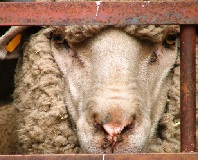Read the latest information on
Foot-and-mouth disease

The new National Sheep Health Declaration is one of the best ways you can protect the health of your flock.
Are you a sheep producer looking for more confidence when buying in new stock? Well, help has arrived in the form of the newly created National Sheep Health Declaration (SHD), which replaces the outgoing National Sheep Health Statement.
The SHD is the most important disease risk management tool livestock buyers have available to them. It enables producers to assess the risk of diseases such as virulent footrot, lice, ovine brucellosis, Johne’s disease and other biosecurity risks such as noxious and declared weeds when buying, selling or even if you’re just agisting stock.
Animal Health Australia’s Biosecurity Manager, Dr Rob Barwell says all sheep producers across the country can benefit from using the document.
“There are a range of health conditions that can affect your livestock that often don’t show up without testing and this is why you need that added confidence before you make any kind of investment in new stock,” said Dr Barwell.
“In a lot of ways, you can look at the new SHD as a mechanical check that you might get for a car before you purchase it. The document, which is filled out by the seller, tells the buyer about the disease status of the flock, the vaccinations and treatments they have received or if there are any other factors, such as biosecurity plans in place, that may have been actioned to further guarantee the health of the livestock,” said Dr Barwell.
Dr Barwell highlighted that the new SHD was designed to replace the outgoing National Sheep Health Statement and is the result of consultation with the sheep industry and governments.
“The SHD now includes a question regarding sheep having access to declared noxious weeds, which are defined as declared weeds or plants, noxious weeds or Weeds of National Significance (depending on the state you are in). This is important, as the weeds can have a serious health impact on sheep or be a biosecurity risk for the property. said Dr Barwell.
Producers who do sell their flocks with an accompanying SHD are advised to retain appropriate records to support this declaration, as making false statements may be liable under fair trading and other relevant state legislation.
The SHD is available on the Farm Biosecurity website and can be filled out electronically to save the time and hassle of filling them out by hand. For other tips and tricks for improving biosecurity for your sheep flock, go to the sheep industry page on the Farm Biosecurity website.